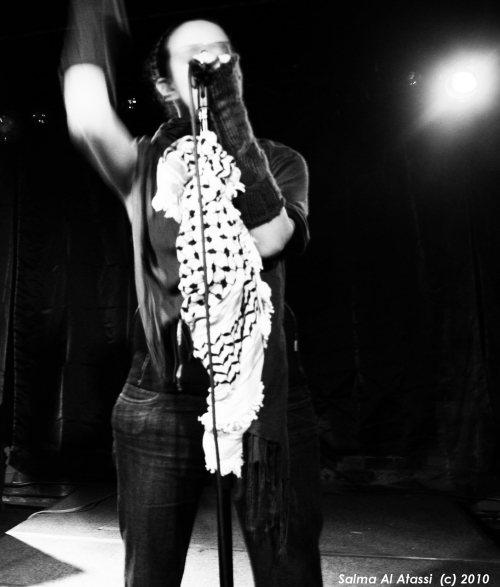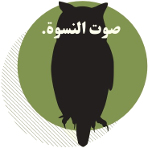
It had been long since I had connected with where I come from, when I came across a very special feminist encounter…
I met Sabreena Da Witch on women’s day 2010, and it all came together very nicely. I had watched her perform the night before at the closing fundraiser for Israeli Apartheid Week in Toronto. And now, a bunch of us sat together talking about what feminists coming together usually talk about: politics, which leads only to the most personal.
Sabreena had so much to say and we were all ears – we had all obsessively watched her movies and listened to her music for about a year now. And as expected, what she had to say resonated with us all; she was so raw in her expression on women’s issues, the meaning of justice and a national revolution. She carried a piece of home with her that was a part of all of us as Palestinian, Arab, women and feminist. There was a very special feeling to this gathering… almost like a coincidence.
Sabreena is part of a strong hip-hop movement happening all over the Arab world and especially in Palestine. Music is being used as a medium for speaking out and is now becoming a growing influence in Palestinian cultural resistance. It has become a popular avenue for self-expression to young people during a time when most spaces are sealed off to Palestinians. It also plays an important role in attempting to build bridges between the isolations suffered by Palestinians as a result of apartheid policies. Artists from Gaza, the West Bank and the Diaspora are using this common passion for speaking into the mike to sound voices of Palestinian struggles.
Hip-hop as a political force started to develop and take shape specifically during the second Intifada, a moment considered most crucial and defining amongst our generation in reviving a sense of national political struggle and identity. Sabreena’s own political awakening around Palestine also came in the wake of the second intifada:
“I didn’t know what Palestine is, I never was told what it is to be a Palestinian – the 2nd intifada put that in my face. 13 Palestinians inside of Israel were shot – it just comes to show you that having an Israeli passport doesn’t make you any special.”
Of course once Israel was mentioned, we all started ranting about the hypocrisy of Zionism in preserving an image of itself as democratic, liberal and free to the West. Especially in issues related to women and queer people where Israel claims tolerance and equality but only uses these issues to showcase tokenistic gestures that are intended to mask Israel’s racism and spite towards Palestinians.
“I got fired from my work for speaking Arabic in Israel – democracy, it is not. If you live there for just 2 days, you will realize that if you are not Jewish then you are a nothing… this is what the state of Israel is for me, I’m always treated as a Palestinian, as an Arab, they make sure they remind you of that everyday. There isn’t even the illusion of a democracy.”
When it comes to speaking on women’s issues and Israel in the west, as feminist Palestinians living in the Diaspora, we all shared the experience of being asked numerous times why we thought critically of Israel where women have much more rights than women in Palestinian societies. It felt incredibly refreshing to have a Palestinian woman who lives in Israel and experiences it first-hand to respond to this:
“Israel never protected Arab women when it comes to honor killing; they know what is happening but they use it against Palestinians. So, if it is very obvious that a woman is to be killed, they just step out of it saying that it has nothing to do with us. It is not a country that is equal to all its citizens. They say to you these tribes have their own tribal issues. They don’t care about me.”
The issue of silencing Palestinians is very familiar to us as Palestinians living in the Diaspora. Israeli propaganda has infiltrated all mainstream media as well as popular cultural and academic spaces. The power of their lobby has succeeded in erasing out the existence of an alternative Palestinian voice. A famous example of this is the spotlight on Tel Aviv in the Toronto International Film Festival in 2009. Palestinians were outraged that after the brutal attack on Gaza a few months prior, Israel would be allowed to showcase itself as a modern developed state. This constant wiping out of Palestinian experiences not only plays to normalizing the state of Israel as an occupying colonizing force but also claims to speak of the Palestinian experience of this violence as well.
“I live what I live and no body can cancel that. You be an Arab woman and a Palestinian woman and come tell me what it is like, don’t tell me what my experience is! Don’t speak for me. Speak of your own experience as an Israeli or an American, and I will speak of mine.”
The intersection of women and Palestine proves to be challenging even within the hip-hop movement itself. Similar to national Palestinian resistance movements, national resistance through hip-hop contains a great deal of sexism and misogyny. Women artists face pressure to sing about Palestine before they can talk about their issues as women. Being Palestinian and a woman are perceived as mutually exclusive issues; together they are too distracting from the main nationalist agenda. Notice as well that this strand of thought is very similar to what we face when attempting to speak on justice for Palestine in mainstream queer rights spaces.
“I recall going to events were I was told that I’m not allowed to speak of women issues – politics first, they said to me, women rights are not our main subject. But I am Palestine. I’m a Palestinian person – whenever I speak, I speak of Palestine – whether it is right here or not, when I speak of women’s issues, I speak as a Palestinian woman – there is no such thing as we’ll take care of women’s rights later”
Women artists also have the added challenge of navigating cultural boundaries to be able to perform. Sabreena recalled difficult struggles with her family to accept her as a hip-hop artist. As she spoke, it seemed very obvious that at the core of her resistance for Palestine was her own struggle for her right to exist as a woman making her own choices, and somehow to the outside world the two couldn’t co-exist. The fight for a just and free Palestine excluded her as a woman.
“I was disappointed because I was treated as a woman first and then Palestinian. Even singing for Palestine gave me trouble, I would sing for Palestine and then my parents would yell for hours when I come home. I had to convince them every day to please let me perform.”
It was very obvious that the depth of our struggles as women is tied to this idea of women upholding the honor of our entire societies and culture. However, in order to be truly full in our analysis, we could not ignore the grander scheme of things and as feminists, we could not but point out how racism and sexism intermingle and inform one another to fulfill greater agendas of patriarchy existing everywhere.
“Up until I came to American, I had issues with the men in my community, they were the problem, Arab people don’t know how to deal with women especially if they are strong. I come here and it is worst because here they think that women are free”
We talked about the growing BDS movement (Boycott, Divestment and Sanctions) as a powerful and hopeful opportunity for resistance. We find it empowering because it is mass-based, calls for the participation of the entire world and gives agency to the individual as a contributing force towards achieving Palestinian liberation.
“I believe it brings results; take note on how many cities took part in IAW this year. It shows you where we were and where we are. You know that Zionists are freaking out when they pay attention to us and say: boycott these boycott events!”
We also talked about the complexities of BDS as Israel tries to cut corners in its process of normalizing their presence as an apartheid and colonialist state. It is also a difficult strategy to nuance and, while it is broad enough to fit any context and place, it needs to reflect the specificities of each locality.
“I was asked once what I thought of Palestinians taking part in Eurovision with an Israeli artist. I was completely against it. We don’t have a country! Don’t play this game with us, to have us representing ourselves in a show as Palestinians but we are not really Palestinians – I can’t even tell you here is my country, you can’t give a Eurovision spot and expect me to say thank you very much for letting me sit next to the Israeli representative.”
But our discussion didn’t end sorely – we somehow were celebrating each of our presence and mostly learning from Sabreena about what it takes to lead revolutions:
“Sabreen in Arabic with a double E means patience. If you study revolution, you realize that without patience you are not a revolutionary because if you expect things to change with a finger point you are down to a losing battle. It takes a long time to change generations of sexism, apartheid and racism. But I am not only Sabreen or patient but also a witch that is powerful and can rock your world”
In hindsight, this was a lot more than just a coincident gathering of women with similar experiences of resistance…it was a feminist one, like the kind that you attract to yourself. It was revolutionary like most of our choices have been. This was in fact a feminist encounter, one that we paved our path to, one that is as deliberate as encounters come.
NOTE: Information included in this piece and all quotations are taken from an interview done by Kan Ya Ma Kan – a women-run Arab radio show that airs in Toronto, Canada every Tuesday on CKLN.
Sabreena’s Newest Album “Women under the influence” includes 15 songs written and composed by her. You can purchase her album online.
Publisher:
Section:
Category:






